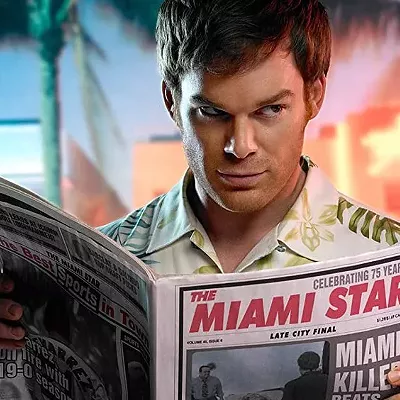Max Bialystock (Jerry Sciarrio) has hit hard times. The erstwhile “King of Broadway” has been reduced to a man who finds lonely old widows to bankroll theatrical productions like Funny Man, a musical version of Hamlet. So dire are these productions that opening night and closing night are one and the same.
Along comes the neurotic accountant Leo Bloom (Mark Pleasant). While going over Bialystock’s muddled ledgers, Bloom makes the throwaway comment that it’s possible to earn more from a Broadway flop than from a hit. All one needs to do is raise more money from backers than is spent on the play. Dollar signs appear in Bialystock’s eyes, and he ropes Bloom in as his accomplice.
So the two set about assembling the worst play ever staged. They discover Springtime for Hitler, penned by half-witted Nazi sympathizer Franz Liebkind (Dan McKeever), and they persuade the flamboyant transvestite Roger De Bris (Lance Babbit) to direct it. Bialystock woos $2 million from his widows. Then he and Bloom rub their hands together and wait for the inevitable.
Only, the inevitable isn’t quite what they expect. Springtime for Hitler becomes a glorious train wreck of entertainment. Audiences can’t get enough, and critics hail it as a satirical masterpiece. For Bialystock and Bloom, never has a success been such a failure.
To the audience of The Producers, written by iconic funnyman Mel Brooks, the success of its play-within-a-play should come as no great shock. Not because the plot of the musical itself — six years on Broadway, winner of 12 Tony awards — and the 1968/2005 films is already so familiar, but because so much of what we enjoy about The Producers can be found in the knowingly tasteless musical at its heart: the gags that fall somewhere between cringe and chuckle, the profoundly flawed characters, the sheer delight it takes in dishing out offense, the overblown camp. The only difference, perhaps, is (crucially) the cluelessness of cast and crew in Springtime for Hitler.
Under the direction of Marianne McLaughlin, the Civic pulled off a great show by correcting many of the faults that bedeviled the 2011-2012 season. Whereas in the recent past its strong leads have often been left isolated by shaky support, here the excellent supporting cast (Babbit, McKeever, Pierson) enhanced the clear talent and suitability of the leads (Sciarrio, Pleasant). Just as importantly, the vocals were sufficiently well defined that the frequent puns and turns of phrase weren’t swamped by the music; though that balance came at the expense of relegating the orchestra back to the pit. The sets, costumes and choreography were nothing short of impressive — even downright dazzling at times — but they never overshadowed the people and the story.
Perfection did elude them, however. Ali Waid’s ambitious choreography — which includes duo and ensemble tap sequences as well as prop-aided numbers — occasionally frayed just enough to disturb the sense of wonderment. Almost all the actors reached for notes that were just beyond their grasp, and during the ballad “Till Him,” the orchestra and leads pulled in three different and unnerving directions. The choreography will likely smooth itself out over the course of the run.
But for every caveat, there are a dozen reasons to cheer. It’s the spirit of gleeful irreverence that makes The Producers such fun, and this production channels that blithe spirit brilliantly.
The Producers • Sept. 21 through Oct. 21, Thu-Sat at 7:30 pm, Sun at 2 pm • Spokane Civic Theatre • 1020 N. Howard St. • $29, $27 seniors, $22 students • spokanecivictheatre.com • 325-2507


















